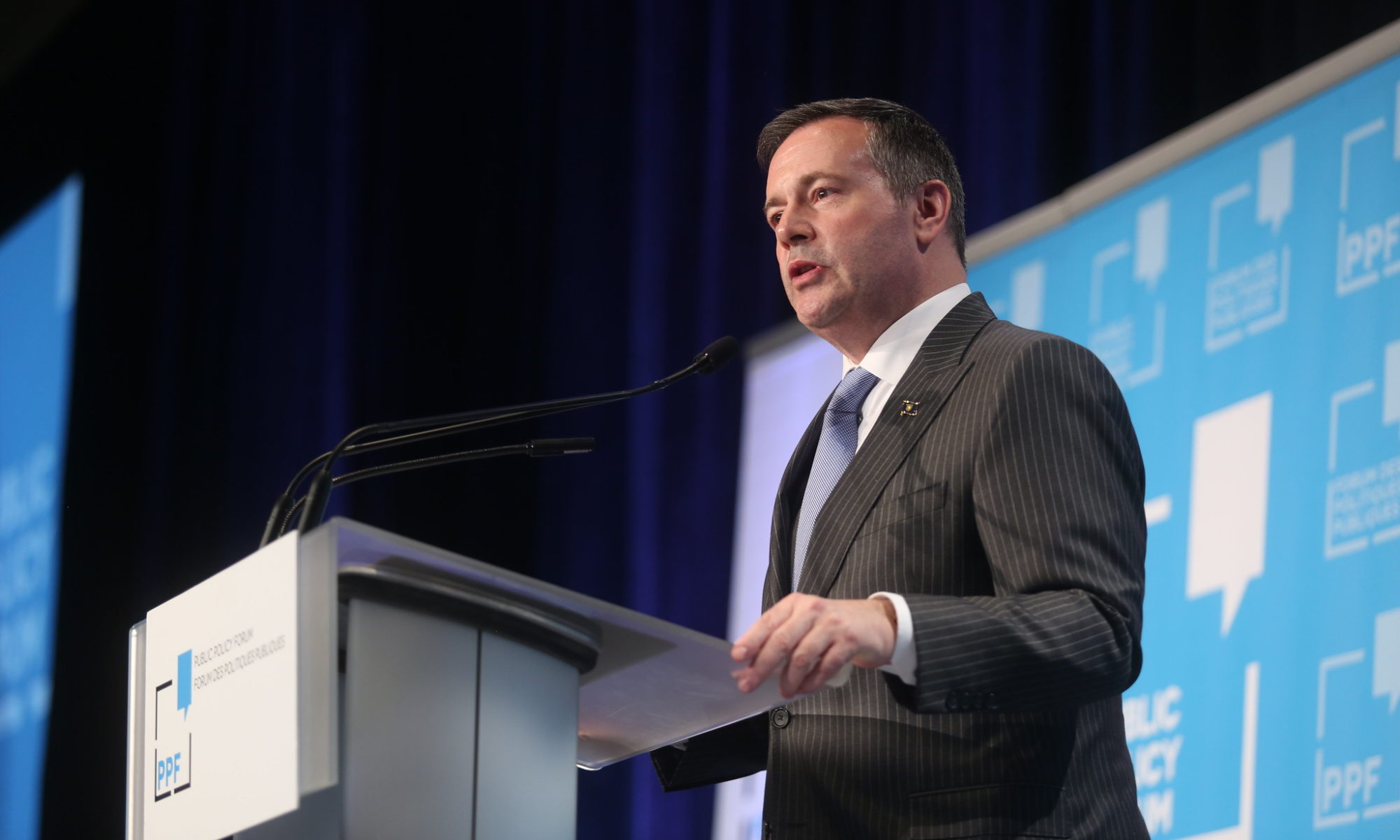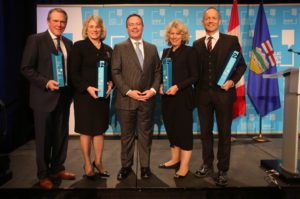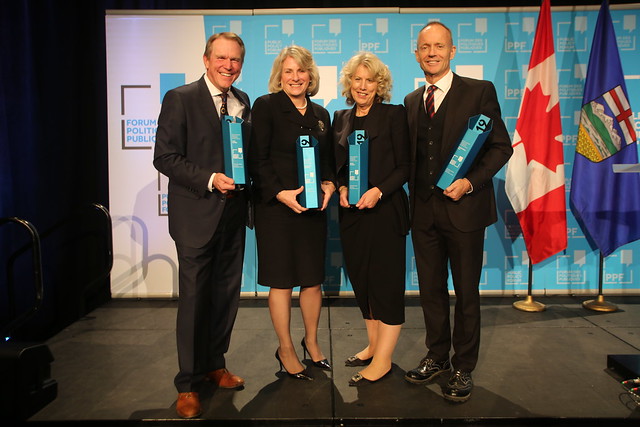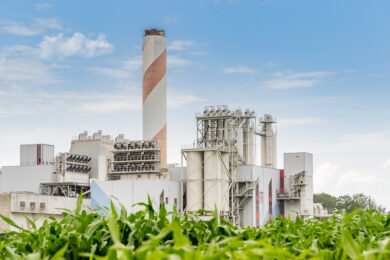
Premier Jason Kenney at the 2019 Peter Lougheed Awards Dinner
Three forms of reconciliation Alberta's provincial government is working towardWatch the full speech
- See what you missed at PPF’s Peter Lougheed Awards Dinner 2019
Read the text of the speech
“Well thank you so much, Ed (Greenspon) for those remarks […]
And thank you so much Miiksika’am (Elder Clarence Wolfleg) for your prayers that opened us and, by the way, Miiksika’am has served in our uniform in the Canadian Armed Forces in Cyprus and various places around the world. So as we are just three days after Remembrance Day, thank you so much for your service and that of all of our veterans.
Friends, it is a great privilege to be here this evening to help remember the legacy of the great Peter Lougheed, and to help present awards in his honour to four truly distinguished Albertans: Elizabeth Cannon, Stockwell Day, Dawn Farrell and Dave Mowat. Each of whom I regard as friends, all of them remarkable in their own right, all four of whom personify the spirit of innovation that has made Alberta one of the most prosperous and generous places on the face of the earth.
Whether it was building the world’s GPS network in one of our great universities, or balancing budgets and reforming taxes, or transforming one of Alberta’s great energy companies against tremendous adversity, or modernizing one of our great financial institutions, the four individuals we’re honouring tonight, well, they’ve done it all. Elizabeth, Stockwell, Dawn and Dave personify that can-do, get-‘er-done spirit of Albertans, and on behalf of the government and people of Alberta, let me congratulate each of them on this richly deserved recognition tonight.
How fitting that they are being honoured with an award named after another great Albertan, the late Peter Lougheed, whose vision led to one of the greatest economic booms in Canadian history; who was a proud Albertan but a profoundly, deeply felt Canadian patriot from a great Canadian family. His refusal to back down in defence of Alberta’s just claims for control of our economic future earned him a special place in our province’s history.
Another late premier, Jim Prentice, a friend of many of us, a former colleague of mine, wrote a book called Triple Crown in which he argued about Canada’s three challenges — three things he said: Indigenous reconciliation, energy, and the environment. And he argued that these things are deeply connected and can only be resolved by solving them together. And I agree with our late friend Jim. And tonight I want to sketch out, briefly, three forms of reconciliation that Alberta’s government is trying to undertake. First of all, reconciliation with Alberta’s Indigenous people. Secondly, reconciliation of energy growth and environmental stewardship. And thirdly, reconciliation of the provincial and federal fields within our Confederation.
On the first, our new government is following the path of reconciliation with Indigenous people. That is why we restored, within weeks of forming office, the custom of an annual meeting between Alberta’s cabinet and all of Alberta’s treaty chiefs. We gathered 46 of our chiefs from across the province to a remarkable day-long meeting, which we found a profound consensus, something close to unanimity, in favour of partnerships in responsible resource development. We’re also renewing and seeking protocol agreements with several different First Nations groups in Alberta, including our recently signed renewed protocol agreement with the Blackfoot Confederacy that we signed on the anniversary of the treaty signing at Blackfoot Crossing.
And let me add that just yesterday, I was visiting one of Alberta’s great cultural institutions, the Glenbow Museum, and discussing with them as I did in England recently, an effort to repatriate the personal artifacts of Chief Crowfoot that ended up at the Exeter Museum. We’re trying to bring them back to the Blackfoot people here in Alberta.
We are creating, what I think will be a game-changer, in Indigenous-Crown relations and our ability to get our resources to market, with the recent adoption of the Alberta Indigenous Opportunities Corporation, backstopped by $1 billion of the faith and credit of the Alberta Crown, to facilitate Aboriginal financial participation and co-ownership of major resource projects. I’d like to thank—I should have begun by acknowledging—my boss. Her Honour the Lieutenant Governor, thank you for signing that into law two weeks ago.
I truly believe that it is a moral obligation of this generation of Canadians to ensure that our Indigenous people benefit materially from the responsible development of the resources that lie below the lands that their ancestors first inhabited. Alberta has already been — in one of the many ways in which we have been a great example of social mobility and progress — is through the inclusion of our Indigenous people in resource development, with by far Canada’s highest levels of employment and incomes for Indigenous Canadians, thanks in large part to the progressive and visionary leadership of our resource companies. But we have only just begun. We need to move beyond contracts and benefit agreements to facilitating actual ownership stake for our First Nations. And we are determined to do that. And I believe this will be the game-changer in getting market access for our world-class resources.
And it is also an area of common ground between the Alberta and federal governments. Prime Minister Trudeau and I agree that our most important natural resources infrastructure project, the Trans Mountain pipeline expansion, should have, and I see Ian is here somewhere […] [Gives thanks to Ian Anderson]. And so the Prime Minister and I are agreed that First Nations should have a substantial equity ownership position in the Trans Mountain pipeline. And we’re keen to work with Ottawa to make sure that this happens. And this is one of the reasons that we created the Indigenous Opportunities Corporation.
We’ve also created the Indigenous Legal Defence Fund to give a fair voice share to the vast majority of western Canadian First Nations who are in favour of responsible resource development, but too often have been crowded out and left aside when it comes to debates on energy and the environment. And so this is a fund that will help to bring the voice of pro-development nations into our courts, because they have a right to assert their right to economic development, to be partners in prosperity, to move their people from poverty to prosperity.
I would say it is somewhat ironic that governments and energy companies alike are finally embracing First Nations co-ownership of resource industries at a time when those industries are facing dramatic challenges and sustained attacks both home and abroad. But if we are going to ensure a prosperous future for Indigenous Canadians, as co-owners and co-creators of resource wealth, we must ensure a vibrant future for those energy and resource industries in the first place.
In order to do that, we need to take our second path of reconciliation. And that is reconciliation between energy development and the environment, especially in dealing with the challenge of greenhouse gas emissions and of climate change, which we Albertans take very seriously. Now many people claim that there is no future for oil and gas, that building oil sands projects and pipelines is all pointless, is unsustainable, and that these all represent stranded assets. […] But to those who doubt that we can lower our emissions and green the oil sands while still producing millions of barrels a day, you are underestimating Alberta’s culture of innovation. It took decades of research and commitment from visionary leaders like Ernest Manning and Peter Lougheed, and huge scientific investments at our academic institutions, particularly the University of Alberta, to unlock the potential of our oil sands. But just as science was unlocking how to extract oil from bitumen, it was also realizing the unintended consequences of centuries of fossil fuel combustion, like releasing CO2 into the atmosphere. And this has led to groups like 350.org and others to call for leaving it in the ground and for European financial institutions like HSBC, Zurich, Axa, Munich Re and others to refuse to underwrite or invest in oil sands projects. I must add as an aside, all the while they’re quite happy to provide financial services to the facilitation of OPEC oil.
The challenge for us today though, is to ensure that the oil sands are not only one of the largest petroleum reserves in the world, with a notional market value of 15 to 20 trillion dollars, but that with technology, they can also become one of the cleanest. The question is how best to do it. And our vision is that we target specific sources of greenhouse gases and work with a combination of policy, technology and market-based industry solutions to reduce those emissions. Alberta actually pioneered this approach as far back as 2007.
And just two weeks ago, our government introduced legislation to further strengthen our levy on major industrial emitters through the Technology Innovation and Emissions Reduction program, or TIER program. This plan sets a clear market signal to reduce carbon and the revenue generated and TIER will also help to finance new technologies that will achieve even more reductions. Finding solutions that lower GHGs while generating economic value will ultimately be the key to solving the climate challenge that we cannot ignore.
But we will not only lower GHGs from oil sands operations. We will also take back the carbon dioxide that is released through carbon capture, utilization and storage. Which, as I think most people acknowledge, is now reaching a point of efficiency where it is scalable. Using carbon levies from the TIER fund, we intend to help bring some of these next horizon technologies to market.
And we will work to get our natural gas, as well, to developing markets to displace emissions there, and get credit for it here, using Article VI of the Paris Agreement. And, we will insist that the national government acknowledge that the single greatest way that Canada can reduce global greenhouse gas emissions would be to export our liquefied natural gas resources to developing markets to help them in the global conversion from coal to gas. And, we will not relent until there is recognition of this enormous potential that we have, both to prosper and to reduce emissions worldwide.
This is the emerging vision of Alberta’s industry and of Alberta’s government. It is the path of reconciliation between energy and the environment. But for us to succeed we’ll need a federal government in Ottawa that is a true partner in our development and not a roadblock to it. This brings me to the third path of reconciliation that I’d like to talk about: reconciliation between the centralizing tendencies of the Ottawa government, and the right of provinces to have control over our future [French].
This weekend I outlined a number of ways by which Alberta could assert a larger role in the federation. Don’t worry, I won’t repeat myself. It was a Castro-length speech—an hour and 10 minutes on Saturday. In fact, my friend Ted Morton said that at the 45-minute mark he thought he saw Fidel Castro climbing out of his grave to stretch his legs. So I won’t repeat that. But the essence is this: We need a fair deal that respects the constitution and gets Ottawa out of our way so that we can do what we do best—grow our economy, get our people back to work, and generate an oversize share of Canada’s wealth.
Nothing that we are asking for is unreasonable. Some of our demands, like a guarantee to build TMX by a firm fixed date, an equalization rebate that recognizes that we’ve been shortchanged at least nearly $2 billion by an arbitrary cap on the so-called Fiscal Stabilization Program, equivalency agreements on methane and carbon regulations, fast-tracking of energy projects to get people to work, and support to get Albertans back to work on oil well reclamation, which can also help the environment. These things could be done tomorrow if Prime Minister Trudeau means what he said on election night about being there for people in Alberta and Saskatchewan. Other proposals are well within our control like opening offices as we will now do in Ottawa, Quebec and British Columbia to defend and articulate Alberta’s interests, which we believe are also the national interest.
Finally, other ideas like creating an Alberta pension plan or collecting our own taxes, well, they require more study, which is why we created a Fair Deal Panel of distinguished Albertans to consult widely across the province and report back to the government next spring with their recommendations. Where there is a good case for change, we’ll seek a democratic mandate by having them endorsed by Albertans in a referendum before proceeding with any changes. And at the end of this process, our goal is to win a bigger voice and a fairer deal for Alberta within Canada. A fair deal, a reasonable deal, a workable deal. One that I believe Peter Lougheed would recognize in the spirit of his own negotiations with Ottawa 35 years ago.
And, let me pause to say that, for those who characterize our press for fairness as a kind of provincialist, parochial, introverted push, they completely misunderstand the Alberta spirit. I believe that, in their heart of hearts, the vast majority of Albertans are patriotic Canadians. It is a tragedy that a growing number of our fellow citizens see themselves as not being fully at home in their country—a country that we have dutifully served and to which they have contributed disproportionately. And I further believe that we Albertans are big Canadians. We believe in the original vision of the Constitution as an economic union. In fact, at the Council of the Federation meeting with other premiers this summer, I argued more than any of my colleagues in defence of the legitimate exercise of the federal power as originally conceived in the Constitution to ensure free trade, full labour mobility within Canada. And the federal paramountcy over inter-provincial infrastructure like the power under Section 92 that built the Canadian Pacific Railway that united our country in the first place, and the power that should be used to ensure the construction of energy resource corridors, including oil and gas pipelines.
And I point out to our fellow Albertans every day that we should not feel isolated, that we do have allies from coast to coast. Nine of 10 provinces who supported our call for a rewrite of the Bill C-69. Nine out of 10 provinces who endorsed our call for energy and resource corridors including oil and gas pipelines. Canadians, by a margin of 2 to 1, including 2 to 1 in British Columbia, support the completion of the Trans Mountain pipeline. Albertans should not feel isolated. We actually stand very much at the center of Confederation. We simply call for a renewal of the original vision of the economic union of Canada. We will not be made to feel unwelcome in the federation of which we have always been champions.
And so, in closing, let me once again thank and recognize tonight’s fantastic honourees, each of them great Canadians and Albertans. I know at least two [came from outside Alberta] – Elizabeth came from Prince Edward Island, Stockwell grew up in Ed’s home territory, the west side of Montreal [and Dave and Dawn are from Calgary]. So we’ve got two native-born Albertans, two migrants to Alberta, a pretty typical cross-section of the people who have built this province. I look forward to working with them, with the Public Policy Forum, and with many of you, to renew Alberta’s place in the Canadian federation and to pursue the path of reconciliation. Reconciliation with Indigenous people, reconciliation of responsible resource development with the environmental challenges of our time and reconciliation with the great Canadian federation.
Thank you very much.”





